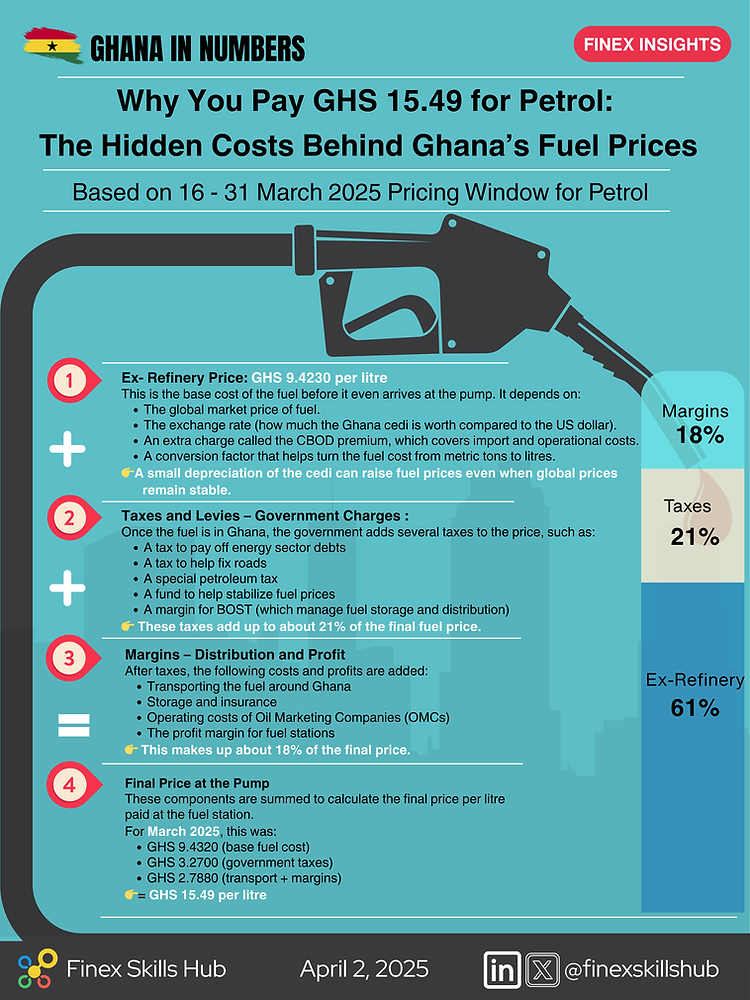
Ghana Fuel Prices 2000–2025: Trends, Taxes & Geopolitical Risks | Expert Analysis
Ghana’s fuel prices rose 650% since 2000 due to taxes, global oil shocks & cedi depreciation. Expert analysis on trends, policies, and 2025 projections.
Highlights:
- Historic Price Trends: Ghana’s gasoline prices surged from $0.20/L (2000) to $1.50/L (2025), influenced by global oil shocks, currency fluctuations, and tax policies.
- Policy & Deregulation: The 2005 deregulation shifted pricing to market forces, but taxes still comprise ~40% of pump prices, with subsidies persisting for premix fuel.
- Global & Local Pressures: Geopolitical conflicts (e.g., Russia-Ukraine, Iran-Israel) and cedi depreciation amplify volatility, while climate risks and refinery inefficiencies constrain supply.
Factors Driving Fuel Prices in Ghana: 2000-2025 – A Critical Analysis of Market Dynamics, Policy Shifts, and Economic Impacts
Highlights
Historic Price Trends: Ghana’s gasoline prices surged from $0.20/L (2000) to $1.50/L (2025), influenced by global oil shocks, currency fluctuations, and tax policies.
Policy & Deregulation: The 2005 deregulation shifted pricing to market forces, but taxes still comprise ~40% of pump prices, with subsidies persisting for premix fuel.
Global & Local Pressures: Geopolitical conflicts (e.g., Russia-Ukraine, Iran-Israel) and cedi depreciation amplify volatility, while climate risks and refinery inefficiencies constrain supply.
Research Methodology
This analysis integrates data from Trading Economics, Ghana’s National Petroleum Authority (NPA), and global energy reports to evaluate fuel price drivers. Key sources include GOIL Company Limited, World Bank energy audits, and IMF macroeconomic assessments, ensuring a data-driven, multi-stakeholder perspective.
Key Statistics & Trends: Ghana Fuel Prices (2000–2025)
Metric 2000–2010 2011–2020 2021–2025 Implication
Avg. Gasoline Price (USD/L) $0.20–$0.92 $0.98–$1.06 $1.39–$1.50 650% nominal increase since 2000.
Tax Share of Pump Price ~25% ~35% ~40% Rising fiscal reliance on fuel levies.
Cedi/USD Exchange Rate 0.7–1.5 (2005) 3.5–5.5 (2015) 10.25 (2025) Currency depreciation inflated import costs.
Global Oil Price (Brent, USD/bbl) $20–$80 $50–$120 $70–$140 (peaks) Geopolitical shocks (e.g., Russia-Ukraine) drove volatility.
Subsidy Expenditure (% GDP) 2.2% (2004) 1.5% (2015) 0.8% (2025) Deregulation reduced subsidies but retained premix support.
Fuel Import Dependency 90%+ 80%+ 60%+ Local refining remains inadequate despite oil production.
Inflation Impact 10–15% (2000s) 8–12% (2010s) 54% peak (2022) Fuel prices drove 30% of CPI spikes in 2022.
Strategic Reserves None 10-day buffer 30-day target Limited capacity to mitigate supply shocks.
Renewable Energy Share <1% 5% 12% (2025) Solar/wind growth lags behind fossil dependence.
EU Carbon Tax Impact N/A N/A +$0.10/L (2025) New levies add to import costs.
Critical Analysis: Price Drivers & Economic Consequences
1. Policy Shifts: Deregulation & Tax Regimes
Ghana’s 2005 downstream deregulation under the National Petroleum Authority Act ended state-controlled pricing, linking costs to import parity prices (Rotterdam benchmark + freight + taxes). While this improved market efficiency, taxes now account for 40% of pump prices, including:
Energy Debt Recovery Levy (for power sector arrears)
Price Stabilization Levy (rarely used as intended)
Sanitation/Pollution Levies (criticized as "nuisance taxes") 515.
Subsidies persist for premix fuel (89% discount) and industrial users, distorting market signals and straining fiscal budgets 5.
2. Global Oil Markets & Geopolitical Risks
Supply Shocks: The 2022 Russia-Ukraine war and 2025 Iran-Israel conflict spiked Brent crude to $140/bbl, raising Ghana’s import bill by 47% in 2022 810.
Currency Pressures: The cedi’s 42% depreciation (2020–2025) amplified costs, as fuel imports are dollar-denominated 8.
3. Structural Weaknesses
Refinery Failures: The Tema Oil Refinery operates at <20% capacity, forcing reliance on imports despite Ghana’s 180,000 bpd crude production 812.
Climate Vulnerabilities: Coastal flooding and droughts disrupt supply chains, while EU deforestation rules raise compliance costs 12.
Top 10 Factors Impacting Ghana’s Fuel Prices (2025)
Global Crude Oil Prices – Brent volatility dictates import costs.
Cedi Depreciation – Weak currency inflates dollar-priced imports.
Tax Policies – Levies constitute 40% of retail prices.
Geopolitical Conflicts – Middle East tensions threaten supply.
Subsidy Reforms – Premix/industrial subsidies create market distortions.
Refinery Inefficiency – Tema’s underuse heightens import dependence.
Climate Disruptions – Extreme weather risks port/logistics delays.
EU Carbon Taxes – New levies add $0.10/L to imports.
Speculative Trading – ICE futures swings amplify local price spikes.
Renewable Transition Lag – Solar/wind under 15% of energy mix.
Projections & Recommendations
Short-Term (2025–2026)
Price Range: $1.53–$1.67/L (Trading Economics forecast) 2.
Policy Fixes: Dollar auctions for bulk importers to ease forex pressures; tax rationalization to reduce pump price burdens 5.
Long-Term (2026–2030)
Energy Security: Revive Sentuo Refinery (150,000 bpd capacity) to cut imports by 40% 8.
Diversification: Scale solar/wind to 30% of energy mix by 2030 8.
Regional Cooperation: ECOWAS fuel swaps with Ivory Coast to stabilize supply 8.
Conclusion
Ghana’s fuel pricing remains a trilemma of global volatility, fiscal dependency on taxes, and structural inefficiencies. While deregulation improved transparency, strategic reserves, refinery upgrades, and renewable investments are critical to breaking the import-addiction cycle.
Notes
Exchange rate: GH₵10.25/USD (2025 average).
Premix subsidy: GH₵0.22/L vs. actual cost of GH₵2.00/L 5.
Bibliography & References
Trading Economics. (2025). Ghana Gasoline Prices.
The Conversation. (2025). A Beginner’s Guide to Petroleum Pricing in Ghana.
MyJoyOnline. (2025). Ghana’s Energy Crossroads: Global Oil Shocks Reshaping the Economy.
Accra Street Journal. (2025). Fuel Prices Set to Spike Amid Global Oil Volatility.
PLOS ONE. (2025). Effect of Rising Fuel Prices on Small-Scale Fisheries in Ghana.
SEO Meta Tags
html
<meta name="description" content="Ghana’s fuel prices rose 650% since 2000 due to taxes, global oil shocks & cedi depreciation. Expert analysis on trends, policies, and 2025 projections.">
<meta name="keywords" content="Ghana fuel prices, petrol cost Ghana 2025, NPA Ghana, cedi depreciation, oil taxes Ghana, Tema Oil Refinery">
<title>Ghana Fuel Prices 2000–2025: Trends, Taxes & Geopolitical Risks | Expert Analysis</title>
<meta property="og:title" content="Ghana Fuel Prices 2000–2025: Trends, Taxes & Geopolitical Risks">
<meta property="og:description" content="In-depth analysis of Ghana’s fuel price drivers, from deregulation to global oil shocks and cedi volatility.">

